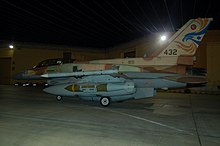The BLU-109/B is a hardened bunker buster penetration bomb used by the United States Air Force (BLU is an acronym for Bomb Live Unit). As with other "bunker busters", it is intended to penetrate concrete shelters and other hardened structures before exploding. In addition to the US, it is part of the armament of the air forces of Australia, Belgium, Canada, Denmark, France, Germany, Greece, Italy, Israel, Netherlands, Norway, Pakistan, Saudi Arabia, United Kingdom, and United Arab Emirates.[2]
| BLU-109 | |
|---|---|
 A BLU-109 aboard an F-15E Strike Eagle configured as a JDAM | |
| Type | Free-fall penetration bomb (guided when equipped as JDAM or Paveway) |
| Place of origin | United States |
| Service history | |
| In service | 1985-today |
| Used by | United States Air Force Israeli Air Force |
| Wars | |
| Specifications | |
| Mass | 2,000 lb (910 kg) |
| Length | 7 ft 11 in (2.41 m) |
| Diameter | 14.6 in (370 mm) |
| Filling | Tritonal[1] |
| Filling weight | 550 lb (250 kg)[1] |


Design
editThe BLU-109/B has a steel casing about 1 inch (25 mm) thick. Its warhead is filled with 550 pounds (250 kg) of tritonal.[3] It has a mechanical-electrical delayed-action FMU-143 tail-fuze.[4]
The BLU-109 entered service in 1985. It is also used as the warhead of some marks of the GBU-15 electro-optically guided bomb, the GBU-24 Paveway III and GBU-27 Paveway III laser-guided bombs, as well as the GBU-31 Joint Direct Attack Munition (JDAM)[5] and AGM-130 air-to-surface missile.
Variants
editThe BLU-118 is reportedly a thermobaric explosive filler variation on the BLU-109 casing and basic bomb design.[6] It contains PBXIH-135, a traditional explosive.[7]
In 2015 General Dynamics started a $7.2 million development of a version called HAMMER, which is intended to destroy chemical and biological substances by spreading dozens of Kinetic Fireballs Incendiaries (KFI) (not explosions) inside a bunker. The KFIs evolved out of the earlier Small Business Innovation Research (SBIR) program by Exquadrum, Inc. of Adelanto, California.[8]
Operators
editThe BLU-109 has been sold to key US allies including South Korea, Israel, Greece, Saudi Arabia, UAE, Pakistan, and Turkey[9][10]
- United States: United States Air Force
- Morocco: Royal Moroccan Air Force
- South Korea: Republic of Korea Air Force
- Greece: Hellenic Air Force[10]
- Turkey: Turkish Air Force
- Israel: Israeli Air Force
- Serbia: Serbian Air Force
- Pakistan: Pakistan Air Force
- Saudi Arabia: Royal Saudi Air Force
- UAE: United Arab Emirates Air Force
- The Netherlands: Royal Netherlands Air Force
Operational history
editIn late 2023, the United States delivered 100 BLU-109 bombs to Israel.[11] Israeli F-15I fighter jets are believed to have used BLU-109s with JDAM guidance kits in the strikes that killed Hezbollah leader Hassan Nasrallah in Beirut on 27 September 2024.[12][13]
See also
editReferences
edit- ^ a b BLU-109/B fact sheet - Hill AFB, USAF
- ^ "BLU-116/B". Forecast International. 2004. p. 4. Archived from the original on 10 March 2012. Retrieved 12 May 2011.
- ^ J. Hart, Russell (15 February 2012). "Defeating Hard And Deeply Buried Targets in 2035" (PDF). Defense Technical Information Center (.mil). p. 7-8. Retrieved 5 July 2024.
- ^ "Gulf War - Air Power Survey, Volume IV - Weapons, Tactics, and Training" (PDF). U.S. Department of Defense. p. 71. Retrieved 4 July 2024.
- ^ Chow Seng, Chor (December 2008). "A Business Case Analysis of the Hard Target Void Sensing Fuze (HTVSF) Joint Cap Capability Technology Demonstration (JCTD)" (PDF). Defense Technical Information Center (.mil) | Naval Postgraduate School. p. 1. Retrieved 5 July 2024.
- ^ "BLU-118/B Thermobaric Weapon". GlobalSecurity.org. Archived from the original on 27 July 2019. Retrieved 6 December 2013.
- ^ Little, Robert. "A race to get a new bomb for cave war". The Baltimore Sun. Archived from the original on 7 April 2014. Retrieved 5 April 2014.
- ^ Drew, James. "Pentagon taps General Dynamics to test fireball bunker bomb". Archived from the original on 19 February 2018.
- ^ "The Most "Political" of All Bombs". Archived from the original on 6 September 2018.
- ^ a b "BLU-109/B (Bomb Live Unit)". www.haf.gr.
- ^ "US sends 'bunker buster' bombs to Israel for war on Gaza, report says". Al Jazeera. 2 December 2023.
- ^ "Israel likely used U.S.-made 2,000-pound bombs in Nasrallah strike, visuals show". The Washington Post. 29 September 2024.
- ^ "US-made 2,000-pound bombs likely used in strike that killed Hezbollah chief Nasrallah, CNN analysis shows". CNN. 30 September 2024.